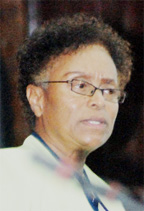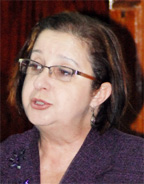The National Assembly yesterday unanimously approved 15 nominees for appointment to the constitutional Women and Gender Equality Commission.
The Assembly passed a motion approving the nominees and adopting the report of the Committee on Appointments on the nomination process, which PPP/C MP Gail Teixeira described as fair, transparent and inclusive. With agreement on the nominees, Teixeira, the Chairperson of the Appointive Committee, also said she was “extremely hopeful” of reaching agreement on the Indigenous Peoples’ Commission before the parliamentary recess, thereby being able to set up the Human Rights Commission by year end. “We are anxious to move forward,” she said, adding that Opposition Leader Robert Corbin or his representative had “better start thinking” about nominees to chair the Human Rights Commission, “So that we could move quickly when we finish these commissions.” Under Article 212N(3) of the Constitution, the Chairperson of the Human Rights Commission is be appointed by the President from a list of six persons, not unacceptable to him, submitted by the Leader of the Opposition after meaningful consultation with entities with experience in human rights matters.
There had been an attempt to reach agreement on the nominees for appointment to the Commission in 2005, but it subsequently collapsed, with the government blaming the PNCR for the outcome. At that time, there had also been concern about the committee being less Georgetown-centric and more geographically representative-a situation that Teixeira says has been resolved with the new nominees.

The nominees are: Vanda Radzik, Shalimar Ali-Hack and Magda Pollard representing women’s organisations; Debra Ann Henry, representing professional bodies; Nandranie Coonjah, Ernestine Barker Logan and Bebbi Haliema Khan, representing Regional Women’s Affairs Committees; Karen Van Sluytman-Corbin, representing the TUC-Advisory Council; Renata Chuck-A-Sang, representing the Private Sector; Gaietra Baron and Gillian Burton representing the Labour Movement; Nicole Cole and Peter Persaud representing Cultural/Ethnic organisations; Indranie Chandarpal, representing the Women’s Progressive Organisation (WPO); and Cheryl Sampson, representing the National Congress of Women (NCW). They were nominated in accordance with a resolution passed by the Assembly on June 13, last year, which approved a list of 110 entities to be consulted.
The nomination of Chandarpal and Sampson, who are both serving MPs for the governing PPP/C and the PNCR-1G, respectively, was, however, identified as a concern by both PNCR-1G MP Amna Ally and AFC MP Sheila Holder. Ally, while recognising the “distinguished” service of both women in the struggle for women’s rights, said “in the future there should be clear guidelines” to ensure there is “no repeat of such a situation.” Noting that the Commission would be expected to be independent, Holder said, “the fact that there are MPs from the two major political parties present a problem for the Commission, in terms of its independence -its constitutionally mandated independence.” She added that it was regrettable that no other representatives could be found. She hoped that if either woman is elected to Chair the Commission, she would decline membership to the Human Rights Commission, for the purpose of maintaining the body’s independence; a point that did not sit well with MPs on the government benches. (The Chairpersons of the four other rights commissions are automatically members of the Human Rights Commission, according to the Constitution.)

However, both Teixeira and Donald Ramotar defended the nomination of Chandarpal and Sampson, saying that their political affiliation did not mean they were incapable of finding common ground. Further, Teixeira said when the list of entities for consultation was approved both the WPO and the NCW were included with the knowledge that they were affiliated to the parliamentary parties. She said the issue could be debated by the Appointive Committee and added that if anyone is unhappy with the arrangement they could propose a constitutional amendment. Ramotar, meanwhile, emphasised the historical role of the organisations in promoting women’s rights, arguing that they are deserving of being treated in a special way.
The other areas of concern highlighted by all the parties were the sluggishness of participation of civil society bodies in the process and the shortage of male representation. On the former point, Teixeira explained that while the government is often criticised for dragging its feet on the implementation of the National Stakeholders’ Agreement-which included a time-bound mandate for the establishment of the rights commissions-the process is new and there is a learning curve in the way in which the parliament has to work with civil society. She noted that it took nine months-between July, 2008 and March, 2009-for all the selected entities to submit their nominees. During that time, there was also intervention by members of the Committee, who went to the assistance of non-responsive clusters. As a result, Teixeira said, the Appointive Committee has recognised the need to create a manual of procedures for the entities which would be called to participate in the nomination process, thereby strengthening the engagement with civil society. Holder hoped that civil society would prepare itself in the period until the nomination process to be more actively involved in the election process of members to all of the rights commissions.
Meanwhile, recalling a similar issue with the Rights of the Child Commission, Teixeira worried that the scarcity of male nominees “might reflect old, retrogressive attitudes that women or children are the domain of women” and not all of society.” She said, “The composition reflects a societal problem-seeing these issues as the sole domain of women,” while citing domestic violence, attitudes to women, male absenteeism among other social problems. Holder explained that Committee attempted to persuade civil society of the need for a specific role for men on the Commission but said it was not very successful. “Men have an important role to play as far as recognising the rights of women,” she said.
While Ally said the Appointive Committee should also be allowed to ensure the establishment of Secretariats to coordinate the work of the commissions and ensure their effectiveness, Teixeira assured that it was not an issue, pointing to the operation of the Ethnic Relations Commission as evidence.





